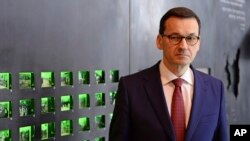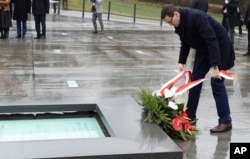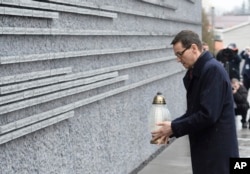Legislation to criminalize certain statements about the Holocaust in Poland could have been timed and presented better, the country's prime minister acknowledged Friday, but he insisted that the law is needed to protect the truth of Poland's wartime history.
Prime Minister Mateusz Morawiecki spoke to foreign reporters at a museum that memorializes Christian Poles who risked their lives to help Jews during Nazi Germany's World War II occupation of Poland.
Poland and Israel have experienced a diplomatic rift over the legislation, which would outlaw publicly and falsely attributing the crimes of Nazi Germany to the Polish nation. If it is enacted, violators could be punished with up to three years in prison.
The United States has joined Israel in criticizing the proposed law, saying it would infringe on free expression. Israeli and Jewish groups fear it would be used to whitewash the involvement of some Poles in killing Jews during the 1939-45 occupation.
Morawiecki, who took office as prime minister in December, has tried in recent days to address the concerns while defending the law. He said Friday that the aim was to prevent the Polish people as a whole from being blamed for what the Germans did in occupied Poland, the location of Auschwitz and other Nazi camps.
Points to Germany
"All the atrocities and all the victims, everything that happened during World War II on Polish soil, has to be attributed to Germany," Morawiecki said. "We will never be accused of complicity in the Holocaust. This is our 'to be or not to be.' "
He insisted the law — which has been passed by parliament and awaits the president's signature — would not impinge on freedom of speech, as feared by some.
"This law is not going to limit speech, not even one iota," Morawiecki said.
He did, however, say that Poland should have better explained its intentions to the world, and acknowledged the timing was "unfortunate."
The lower house of parliament approved the legislation on January 26, the eve of International Holocaust Remembrance Day. The Senate gave its approval on Thursday. President Andrzej Duda now has three weeks to sign or veto it; he has so far indicated that he supports it.
Morawiecki toured the Ulma Family Museum of Poles Saving Jews in Markowa after first paying his respects outside the building at memorials to Poles who helped Jews and Jewish Holocaust victims.
He then sat down with reporters to explain his thoughts on the law. Asked whether he felt the bill had damaged Poland's image, he said he was worried it had.
Yad Vashem, Israel's Holocaust memorial, has documented 6,706 Polish "Righteous Among the Nations" — gentiles who gave shelter to Jews without a profit motive. That number represents only those cases that could be documented, and historians believe there were also many cases that never came to light.
The German forces imposed the death penalty not only on individuals caught helping, but their entire families. Similar laws were in place elsewhere in occupied Europe, but they were imposed more ruthlessly in Poland, according to the POLIN Museum of the History of Polish Jews in Warsaw.
Fears of being found or reported
The people who risked their own lives to save Jews are universally hailed as heroes. Holocaust historians note that Poles who helped Jews had to fear not only the Germans but also Polish neighbors who might report them.
Yet historians also have accused Poland's nationalist government of trying to make it seem that such humanity was the predominant response among Poles. The historians say that ignores the Poles who denounced Jews to the Nazis or killed Jews themselves.
The Markowa museum, which opened in 2016, stands near the place where German soldiers in 1944 killed Jozef Ulma, his pregnant wife, Wiktoria, and their six small children, as well as eight members of the Goldman, Gruenfeld and Didner families whom the Ulmas were sheltering.
Mateusz Szpytma, deputy director of the museum, said it is estimated that between 700 and 1,100 Poles were slain by the Germans for helping Jews during the war.






